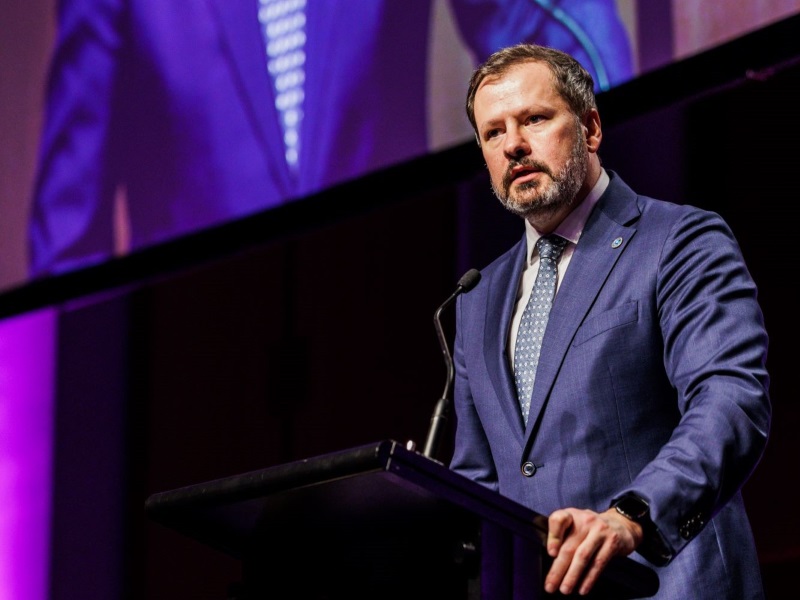California-based startup PsiQuantum was given an “inside run” to a controversial $1 billion investment by Australian taxpayers as the only company that government engaged with in a thorough due diligence process.
By the time Industry department officials invited 21 other competing quantum firms to participate in a ‘secretive’ Expression of Interest process last August, a government taskforce and a team of outside advisers was many months into an investigation into a possible investment in PsiQuantum.
At a Senate estimates hearing on Wednesday evening, Industry secretary Meghan Quinn dug in against criticism of the process that led to the Australian and Queensland governments investing a combined $960 million into the US company.
She said a dedicated government taskforce with representatives from PM&C, Treasury, Finance, Industry and Defence had followed a methodical process and had sought expert legal, commercial, technical and probity advice.
Ms Quinn also categorically rejected reports that the Industry department deputy secretary heading the taskforce assessing the PsiQuantum proposal had been removed from the role for raising concerns about the process and defended its “open” approach to quantum technologies.

By the time the EoI market testing began August last year, PsiQuantum had already been engaged in a lengthy due diligence process with the Industry department on a potential investment to have the firm build the world’s first fault-tolerant error-corrected corrected quantum computer in Australia.
The US firm, which was co-founded by two Australians, approached the federal government for investment support as early as 2019 through an unsolicited proposal put to Austrade and was referred to a global talent attraction taskforce in 2021.
In late 2022 PsiQuantum’s engagements with government “stepped up”, Ms Quinn told Senate Estimates on Wednesday.
This was the same time that Industry minister Ed Husic met with the company twice within a month, including a trip to its US headquarters.
A due diligence process began in the first half of 2023 with the support of the Queensland government, as PsiQuantum was registering as an Australian company based in Brisbane.
Another step up saw the state and federal governments in June 2023 establish a dedicated taskforce and procure legal, commercial and probity advice on a potential deal.
All this occurred before other quantum companies had been approached by government, with market testing only beginning in August 2023 through a secretive call for Expressions of Interest, after the process had been crafted by the taskforce.
The EoI phase – also referred to as market testing – ran until September and canvassed 21 hand-picked firms, which were required to sign non-disclosure agreements to participate.
PsiQuantum was not invited to participate in the secretive EoI. It was already well into engagements with the department and its legal advisers at this point.
“The government gave us the instruction to proceed with testing the market and continuing discussions on a non-binding basis with PsiQuantum,” Ms Quinn said. “The expression of interest process was our main focus, and then there was a subsequent decision to proceed [with PsiQuantum] with all the information available for government.”
Liberal senator Andrew Bragg questioned what chance other quantum companies would have had to win government backing, given the PsiQuantum had already been engaged with the department’s lawyers on due diligence, giving it an “inside run”.
After industry criticism that the process had been designed in a way that favoured PsiQuantum’s particular approach to quantum computing, Ms Quinn on Wednesday insisted the market testing was “open from a technology perspective” and not weighing costs.
“We were asking for the capability that they would bring. In terms of the deliverables, we didn’t pre-specify the technology, and similarly we did canvass envelopes of funding,” Ms Quinn said.
“Because we were asking companies what their capabilities are and what they would need.”
Ms Quinn also categorically rejected reports that the sudden departure of former Industry Department deputy secretary of its science and technology group Duncan McIntyre in mid-2023 was related to opposition to the process.
Mr McIntyre had been responsible for the examination of PsiQuantum since late 2022 and was involved in outlining risks as part of the department’s advice.
He went on leave in July 2023 as the government was stepping up market testing of the deal. But his departure had “absolutely no connection” to the process and the department’s stance did not change without him, according to Ms Quinn, who is responsible for staffing decisions.
She said Mr McIntyre, who is now in a first assistant secretary role at the Department of Health and Aged Care, took a combination of long service, personal and “miscellaneous” leave, and departed of his own accord.
A permanent replacement was appointed within a month, while Mr McIntyre was still on long service leave.
“The indication was he was on long service leave and was unlikely to come back,” Ms Quinn said.
The federal government made a final decision on the deal in February this year and in late April announced it would contribute half of the near $1 billion in grants, loans, and equity investments in PsiQuantum.
Do you know more? Contact James Riley via Email.

